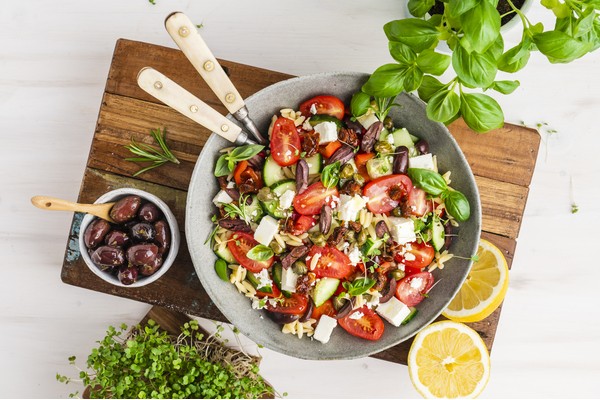Health in your bag ... or rather in your salad. Regular consumption of olive oils containing polyphenols is said not only to caress the taste buds but also to pay tribute to the immune system. What is there to this rumour and how healthy are polyphenols really?
What are polyphenols?
Polyphenols are counted among the secondary plant substances. They are found exclusively in plants and are deposited in the marginal layers of fruit, vegetables, cereals and (stone) fruits - such as the olive. Put simply, polyphenols consist of several phenolic compounds. Phenols in turn consist of an "aromatic ring" and one or more hydroxyl groups.
Good to know: The most important "olive oil polyphenol" is called oleuropein.
What effect do polyphenols have on the body?
Polyphenols are said to have a health-promoting effect on the body. But why are polyphenols in olive oil so healthy? On the one hand, olive oil polyphenols help to protect blood lipids from oxidative stress. Oxidative stress occurs, among other things, when the body is exposed to smoke, environmental toxins, a decidedly high-fat diet or strong UV rays, and can possibly even lead to cancer. A daily consumption of about 20 g (equivalent to about 2 tablespoons) of olive oil is supposed to counteract this (EU Regulation No. 432/2012).
In addition, polyphenols are said to have anti-inflammatory properties. They are said not only to prevent acids and oil-insoluble components from forming, but also to counteract vascular deposits.

Olive oils with a high polyphenol content are said to have a health-promoting effect
Polyphenol content in olive oil
That olive oil is healthy has been proven to us by Mediterranean cuisine for countless centuries. The high proportion of unsaturated fatty acids in virgin olive oils provides a solid starting point from which polyphenol-rich olive oils strive towards a higher health potential. The polyphenol content in relation to the oil plays a decisive role for the likelihood of effect...
The average olive oil from the supermarket comes into the kitchen with a polyphenol content of about 100 mg/kg. A high polyphenol content is defined as 250 mg/kg - and high-quality olive oils, such as the award-winning "MANI extra virgin olive oil, polyphenol", even boast up to 500 mg/kg.
Good to know: According to the European Food Safety Authority (EFSA), only those olive oils that have at least 5 mg of polyphenol per 20 g of oil may be marketed with the following message: "Olive oil polyphenols help protect blood lipids from oxidative stress".
Olive oil containing polyphenols is logically obtained from olives that are particularly rich in polyphenols. But not all olives have the same amount of polyphenols. The polyphenol content of an olive depends on several factors. On the one hand, it varies from variety to variety and on the other hand, the time of harvest plays a decisive role. Basically, the earlier an olive is harvested, the higher its polyphenol content.

For a high polyphenol content, olives must be harvested early and processed gently
But the question of polyphenols is far from being settled with the right time of harvest alone. The (gentle) processing and storage are also important. With refined olive oils, a large part of the healthy ingredients, including polyphenols, is lost during the production process. For this reason, only extra virgin olive oils that are cold-extracted at low temperatures (→ learn more about olive oil production here) have high polyphenol values. In addition, oleuropein is water-soluble and should therefore not be added to the oil during production.
MANI Tip: Coratina olives and Koroneiki olives are particularly polyphenol-rich olive varieties.
How can you recognise polyphenols in olive oil?
On the shop shelf, olive oils containing polyphenols may not stand out at first glance, but with the following tricks, the handle is definitely going in the right direction:
- Grade: Only first or second grade (extra) virgin olive oils are eligible for high polyphenol content.
- Labelling: If an olive oil has passed the official HPLC measurement procedure, the polyphenol content may be indicated on the label.
- Taste: Olive oils with many polyphenols taste distinctly bitter with a fruity, pungent note. By the way, bitter foods are known to positively stimulate the metabolism as well as the digestion.
- Colour: Olive oils rich in polyphenols often have a strong dark green appearance.
MANI tip: Olive oils rich in polyphenols are ideal for cold cuisine. Enjoyed pure, in a salad or on an appetiser plate, the polyphenol can fully express its health-promoting fruit aroma.
So why buy olive oil with a high polyphenol content?
Polyphenols are praised for their plant-strengthening effects and can be easily absorbed through regular olive oil consumption. Polyphenol-rich olive oil(s) ...
- is said to have a health-promoting effect: From 5 mg polyphenol per 20 g oil and with a daily intake, olive oils can protect the body's cells from oxidative stress.
- delight with their extraordinary taste: the bitter-fruity, slightly pungent aroma exquisitely enhances salads, bread and starters.
- come from a high-quality production: Cold-extracted olive oils contain many other valuable ingredients in addition to polyphenols.
The "MANI extra virgin olive oil, polyphenol" is regularly checked to ensure that it meets the quality requirements. Only under these conditions does it reach the woman or the man!

















